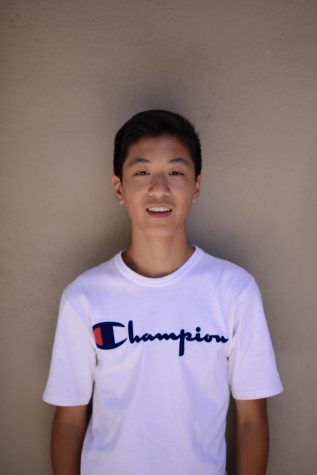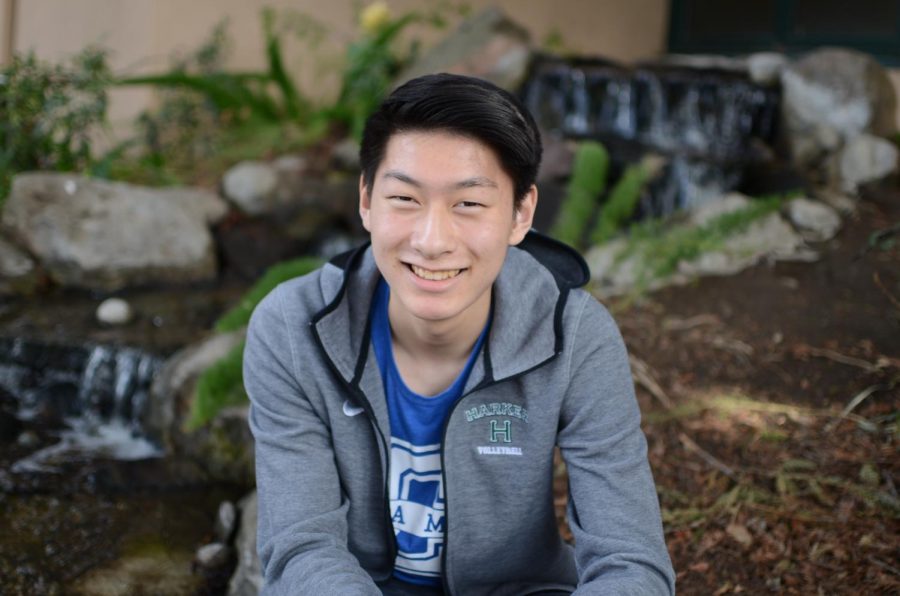Humans of Harker: Behind the decision
Jason Pan (12) navigates life by thinking of others
Whether he is discussing international politics in a debate round, dominating the volleyball court or researching neurobiology, Jason Pan (12) is constantly aware of other people’s thoughts and the reasoning behind their decisions.
Beginning middle school public forum, a team-based debate style has been a central part of Jason’s life. Rather than viewing debate as a way to argue with his opponents, Jason treats every round as an opportunity to learn other’s opinions and to understand why they think in a certain way.
“Talking with your opponent is more intellectually satisfying than spreading at them. Public forum is also more laid back, not work-wise, but like a conversation,” Jason said.
Jason also enjoys public forum because of its team-based nature. In sixth grade, he partnered with a friend to take part in competitions. Due to their seamless collaboration, they were successful.
Max Lee (12) attributes Jason’s people skills to his participation in debate.
“It might come from his debate skills, but he is able to read other people really easily. He uses this to help other people with their problems. As a result, a lot of people like him because he is able to make other people feel better,” Max said.
Although he stopped debating at tournaments during senior year because of the large time commitment, Jason began coaching debate in his high school years.
“He wants to help everyone, not just the people he is close to. It shows you he has something in his heart that’s a basic kindness that he shows to everyone,” Max said.
The way that Jason approaches debate is similar to his role in the Harker volleyball team. Although arguments are not common among the team members, he describes himself as a mediator who doesn’t berate or put others down and appreciates volleyball because of his teammates.
“You are only allowed to touch the ball for so long, so everyone has to work together and there has to be a lot of coordination, and I think the complex plays we are able to pull off is what makes it fun to me. There are so many new things to master when it comes to volleyball,” he said.
While Jason does not expect to play competitively, he plans to continue practicing the sport as a hobby in college. In addition to volleyball, Jason also actively participates in dance, which he enjoys due to the constant interaction between people.
“[Vance Hirota (12)] motivated me to do dance because he thought it would be fun. I also did volleyball with him which I got him to do. I made a deal with him. It was how our volleyball team started. That’s how the people who are now on the team got started,” he said.
Now that he has been part of two dances each year since the beginning of high school, Jason doesn’t regret trying the art.
“Dance is a good way to connect with new and interesting people who have similar passions,” he said.
Jason’s friend Ethan Hu (12) describes his ability to recognize others’ feelings.
“He’s often very understanding when it comes to what other people are going through … I think that that value of him goes underappreciated by other people around him,” Ethan said.
Jason’s interest in understanding how others make decisions introduced him to neurobiology research. He spent time over the summer at a lab manipulating neuron connections in flies in hopes of helping people with brain damage or memory loss.
“I’ve always been fascinated by how people think. That plays into debate. That plays into everything I do,” he said.

Brian Chen (9) is a reporter for Harker Aquila and the Winged Post, and this is his first year on staff. He hopes to develop a journalistic writing style...


















![“[Building nerf blasters] became this outlet of creativity for me that hasn't been matched by anything else. The process [of] making a build complete to your desire is such a painstakingly difficult process, but I've had to learn from [the skills needed from] soldering to proper painting. There's so many different options for everything, if you think about it, it exists. The best part is [that] if it doesn't exist, you can build it yourself," Ishaan Parate said.](https://harkeraquila.com/wp-content/uploads/2022/08/DSC_8149-900x604.jpg)




![“When I came into high school, I was ready to be a follower. But DECA was a game changer for me. It helped me overcome my fear of public speaking, and it's played such a major role in who I've become today. To be able to successfully lead a chapter of 150 students, an officer team and be one of the upperclassmen I once really admired is something I'm [really] proud of,” Anvitha Tummala ('21) said.](https://harkeraquila.com/wp-content/uploads/2021/07/Screen-Shot-2021-07-25-at-9.50.05-AM-900x594.png)







![“I think getting up in the morning and having a sense of purpose [is exciting]. I think without a certain amount of drive, life is kind of obsolete and mundane, and I think having that every single day is what makes each day unique and kind of makes life exciting,” Neymika Jain (12) said.](https://harkeraquila.com/wp-content/uploads/2017/06/Screen-Shot-2017-06-03-at-4.54.16-PM.png)








![“My slogan is ‘slow feet, don’t eat, and I’m hungry.’ You need to run fast to get where you are–you aren't going to get those championships if you aren't fast,” Angel Cervantes (12) said. “I want to do well in school on my tests and in track and win championships for my team. I live by that, [and] I can do that anywhere: in the classroom or on the field.”](https://harkeraquila.com/wp-content/uploads/2018/06/DSC5146-900x601.jpg)
![“[Volleyball has] taught me how to fall correctly, and another thing it taught is that you don’t have to be the best at something to be good at it. If you just hit the ball in a smart way, then it still scores points and you’re good at it. You could be a background player and still make a much bigger impact on the team than you would think,” Anya Gert (’20) said.](https://harkeraquila.com/wp-content/uploads/2020/06/AnnaGert_JinTuan_HoHPhotoEdited-600x900.jpeg)

![“I'm not nearly there yet, but [my confidence has] definitely been getting better since I was pretty shy and timid coming into Harker my freshman year. I know that there's a lot of people that are really confident in what they do, and I really admire them. Everyone's so driven and that has really pushed me to kind of try to find my own place in high school and be more confident,” Alyssa Huang (’20) said.](https://harkeraquila.com/wp-content/uploads/2020/06/AlyssaHuang_EmilyChen_HoHPhoto-900x749.jpeg)



